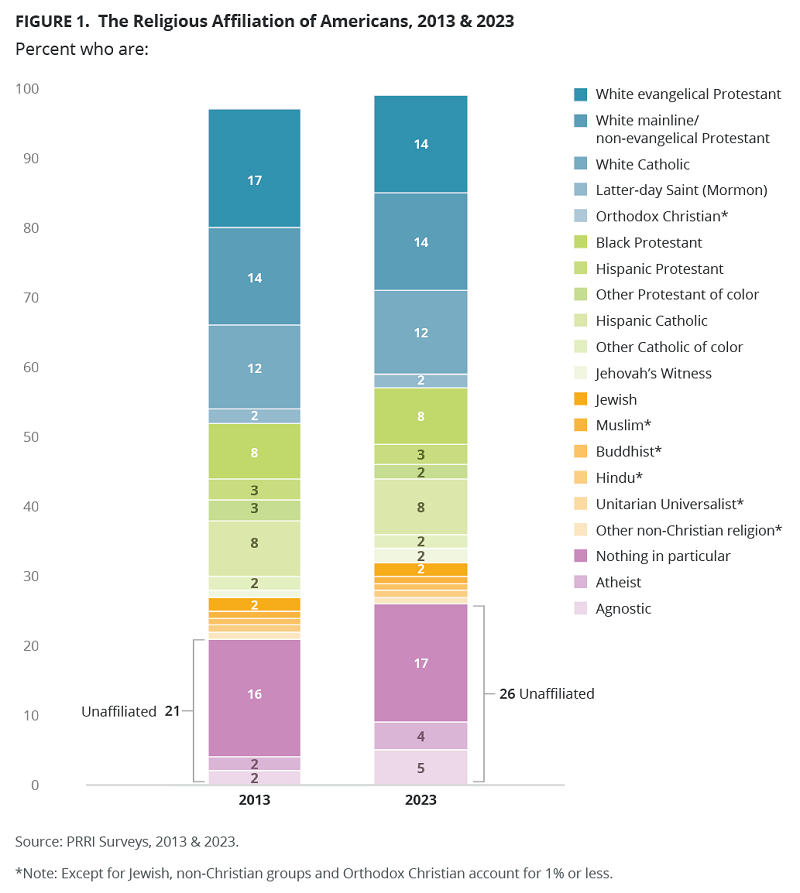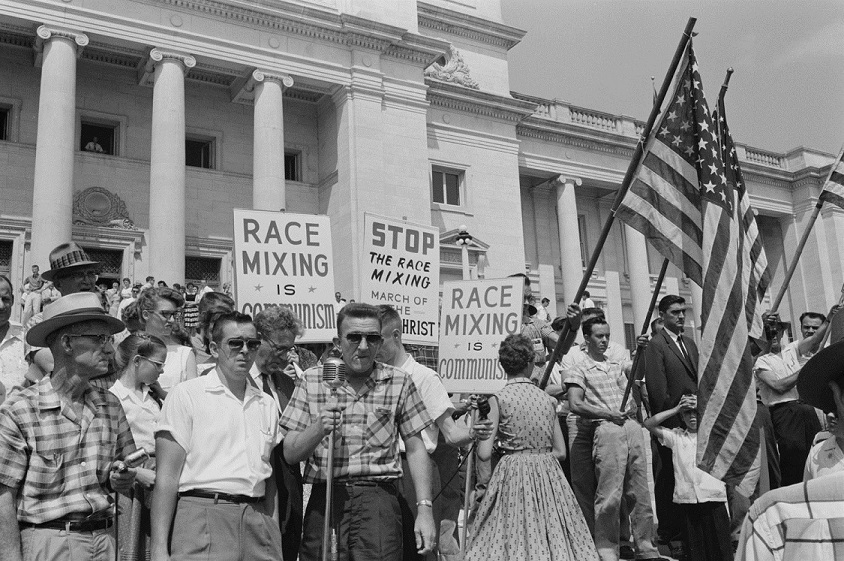In a world with so much cause for doom and gloom, one of the persistent bright spots is the steady growth of the nonreligious, atheists and agnostics. Year by year and decade by decade, organized religion keeps losing strength, while nonbelievers are gaining. Where white Christians once commanded an absolute majority of the U.S. population, with political power to match, they’re now an aging, shrinking minority hanging on by their fingernails. It’s only America’s undemocratic system that’s allowed them to cling to power as long as they have.
The latest evidence of this comes from a 2023 survey by the Public Religion Research Institute, or PRRI for short. Between November and December of last year, they interviews 5,600 Americans to build a picture of religious change. The results broadly echo previous studies on the topic, and give more positive signs for what lies ahead.
Let’s start with the big-print headline finding: All American religious groups are either holding steady or losing membership. The nonreligious are the only major demographic category that’s growing.
Around one-quarter of Americans (26%) identify as religiously unaffiliated in 2023, a 5 percentage point increase from 21% in 2013. Nearly one in five Americans (18%) left a religious tradition to become religiously unaffiliated, over one-third of whom were previously Catholic (35%) and mainline/non-evangelical Protestant (35%).
As you can see from PRRI’s graphic of these findings, the nonreligious are now larger than any single religious group in America. We outnumber white evangelicals, mainline Protestants, and Catholics by a statistically significant margin:

The complication in many of these surveys is that they lump together “the nonreligious” – a catch-all category that includes people who may believe in God, but reject organized religion – with explicitly secular people. We may be similar politically and culturally, but not necessarily philosophically. However, this time, as PRRI notes, the latest wave of growth is coming specifically from atheists and agnostics:
While the percentage of Americans who describe themselves as “nothing in particular” is similar to a decade ago (16% in 2013 to 17% in 2023), the numbers of both atheists and agnostics have doubled since 2013 (from 2% to 4% and from 2% to 5%, respectively).
And, contrary to wishful-thinking apologists who claim that the nonreligious are just disaffected believers who’ll come back to church eventually, PRRI also found that most nonreligious Americans aren’t seeking to join a religion:
The vast majority of the religiously unaffiliated appear content to stay that way — only 9% of religiously unaffiliated Americans say the statement “I am looking for a religion that would be right for me” currently describes them very or somewhat well.
…In 2023, one in ten Americans (10%) report growing up without a religious identity, while 18% of Americans say they became unaffiliated after growing up in another religious tradition. In comparison, very few Americans who grew up without a religious identity joined another religion later in life (3%).
As for why people are leaving religion, there are several main reasons. The most common, in this year as in previous years, is that they simply stopped believing their religion’s teachings (67% of respondents). Hatred and discrimination against LGBTQ people (47%) and clergy abuse scandals (31%) are reliable runners-up.
However, two reasons appeared in the survey that I haven’t seen in previous years. One is people who said religion was bad for their mental health (32%). PRRI notes this answer was more common among LGBTQ Americans, but not exclusive to them.
This makes sense, even if your identity isn’t under attack. As many ex-believers will testify, leaving their religion was like a weight lifting off their shoulders. It’s a reprieve from the fear tactics of fundamentalism – the mindset of sin, shame, judgment, condemnation, and hell. For LGBTQ people, it’s confirmation that they’re not doomed to a loveless life of self-flagellation. For women, it’s freedom from the double standards of religious patriarchy. For all kinds of people, it’s the power to reject smothering expectations and the freedom to choose your own purpose.
The other interesting reason, which has also gained in prominence, are those who left because their church was too political (20%). This tracks with the ostentatious cruelty of white nationalist Christianity in America. Countless churches – mostly evangelical Protestant, but some Catholic as well – have taken a hard right turn in the last decade, becoming outposts of anti-democratic rage and enthusiastic support of fascism. It’s not surprising that people appalled by this are abandoning faith. If anything, I expected this number to be higher!
As religion shrinks and fades, the power base for Christian nationalism and other varieties of supremacist politics will decline along with it. The world will become more peaceful, more democratic and less polarized. In the fever of our current moment, that may seem an unlikely prospect. But that’s just because the human mind has an easier time imagining sudden, dramatic change. It’s harder to envision the cumulative effect of slow change over time – but that kind of change is just as real and at least as important for understanding the shape of the future.





